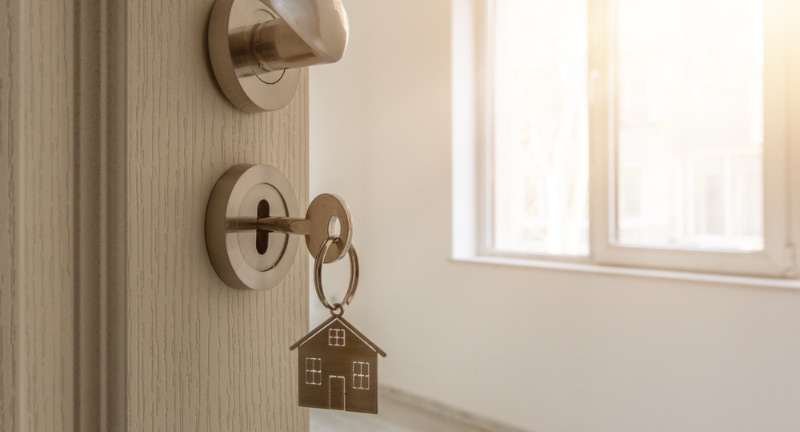ECONOMY
To Buy or Not to Buy? The Realities of Homeownership
Published
2 months agoon

Shutterstock
Homeownership is the dream, right? But before you grab those keys and start planning your Pinterest-perfect living room, let’s talk about what owning a home “really” involves. It’s not just about picking out a new couch (although, who doesn’t love a good shopping spree?). There are perks, sure, but there are also hidden costs and risks that can sneak up on you like a surprise home repair. Get comfy because we’re diving into the highs and lows of owning a home, from mortgage payments to the joys of mowing your lawn!
Flexibility to move

Shutterstock
Renting a home gives you the freedom to pick up and go whenever you desire. Whether you’re moving for a new job, a change of scenery, or simply want a fresh start, renting lets you leave without the burdens of a sale. You’re not tied down by long-term financial commitments, making it ideal for those with a wanderlust spirit. The ability to relocate with ease means you’re always on the move, seeking out new opportunities, experiences, and adventures.
Lower upfront costs

Shutterstock
Renting comes with far less financial burden when you first move in. While buying a house involves a hefty down payment and various closing costs, renting requires only a security deposit and the first month’s rent. This lowers the barrier to entry for many, especially young professionals or those just starting out. It’s a great option if you want to move in quickly without having to drain your savings.
Fewer maintenance responsibilities

Shutterstock
Renting means less stress when it comes to upkeep. The landlord is typically responsible for repairs, leaving you free to enjoy your home without worrying about fixing a leaky roof or broken appliances. This is especially convenient for renters who don’t have the time, skills, or inclination to take on major home improvements. It’s a hassle-free lifestyle where the biggest concern might just be whether to call your landlord for maintenance.
Access to amenities

Shutterstock
Many rental properties come with luxurious amenities that would be difficult to afford if you were buying. Pools, gyms, clubhouses, and even common areas are often part of the package when renting. It’s like living in a hotel with all the perks without having to deal with the long-term commitment of homeownership. Plus, sharing these spaces with neighbors creates a sense of community and convenience at your doorstep.
No property tax

Shutterstock
One of the biggest advantages of renting is not having to deal with property taxes. As a renter, you are spared from paying the annual fees that can make homeownership more expensive than expected. This makes renting an appealing option for those who want to avoid extra financial burdens. No worrying about fluctuating tax rates or how your taxes are impacting your budget — it’s a peace of mind only renters experience.
Easier budgeting (fixed rent)

Shutterstock
Renting provides the comfort of fixed monthly payments, making budgeting simple. You know exactly how much you’ll pay every month, which means fewer surprises. Renters can plan their finances more easily, with fewer worries about fluctuating expenses or unexpected costs. It’s an attractive choice for anyone looking for straightforward, predictable living expenses.
No market risk

Shutterstock
When renting, you are free from the unpredictability of the housing market. Whether the market rises or falls, your rent stays the same unless your landlord raises it, and that’s often a controlled increase. This means you don’t face the risk of losing value on a property or struggling with the financial implications of a market downturn. Renting offers a level of stability in a world where home prices can swing wildly.
Short-term commitment

Shutterstock
Renting offers a short-term commitment, ideal for those not ready to settle down. Whether you’re on a work assignment or exploring a new city, a lease agreement gives you flexibility without locking you into long-term ownership. If your needs or lifestyle change, you can simply decide not to renew your lease. It’s perfect for people who want the freedom to move on at a moment’s notice.
No equity building

Shutterstock
Renting doesn’t allow you to build equity over time. While you make monthly payments, none of that money goes toward owning the property. Over time, you are essentially paying for a place to live, without any financial return on your investment. This can feel frustrating for those who want to own a piece of property and see it appreciate in value.
Limited customization

Shutterstock
Renting can be restrictive when it comes to personalizing your space. Many landlords place limits on what tenants can change in the home, such as painting walls, installing new fixtures, or making other alterations. This can leave renters feeling like they’re living in someone else’s space rather than their own. The lack of creative control is one of the challenges many renters face in making the space truly feel like home.
Rent increases

Shutterstock
Rent prices are not fixed forever — landlords can raise the rent after each lease period. This can lead to unexpected increases that might affect your budget and force you to move to a different property. Rent increases are particularly common in competitive markets or high-demand areas. The uncertainty of these price hikes can create stress and financial strain for renters.
Landlord restrictions

Shutterstock
Renters often face limitations imposed by their landlords, which can range from pet policies to noise restrictions. These rules might be inconvenient or frustrating, especially if you have a pet or like to entertain guests frequently. Tenants have to live by the conditions set by the landlord, which may not always align with their lifestyle. The sense of freedom you might expect from a home can be constrained by the fine print of rental agreements.
No tax benefits

Shutterstock
Renting doesn’t offer the same tax advantages that owning a home does. Homeowners can deduct mortgage interest and property taxes, saving money on their yearly tax return. Renters, however, miss out on these benefits and are essentially left paying full price for their living situation. This can feel like a missed opportunity for anyone trying to reduce their taxable income.
Possible fees (e.g., pet fees)

Shutterstock
Renters often face unexpected fees that can add up over time. Some landlords charge for things like parking, utilities, or pet fees, and these costs can be difficult to predict. Depending on the lease agreement, tenants may find themselves paying extra for privileges or services they didn’t anticipate. These additional costs can make renting feel more expensive than initially thought.
No investment potential

Shutterstock
Renting doesn’t offer any opportunity for investment growth. Each month, you pay rent, but that money does not contribute to ownership or future wealth. If you decide to leave, all that money is gone, unlike a mortgage where your payments eventually build equity in the home. Without this investment potential, renting feels like a temporary solution rather than a long-term financial strategy.
Equity building

Shutterstock
Homeownership allows you to build equity, creating wealth as you pay down your mortgage. Over the years, your property value may increase, and you’ll have a valuable asset that grows in value. Unlike renting, where payments contribute only to living expenses, every mortgage payment is an investment into your future. Eventually, that home can be sold for a profit, making it a rewarding financial venture.
Long-term investment

Shutterstock
Buying a home is one of the most stable forms of long-term investment. The value of your home may appreciate over time, offering a profitable return when sold. Real estate tends to be a solid investment, especially in growing or sought-after areas. This provides not only a place to live but also the potential for substantial financial gains down the line.
Stability

Shutterstock
Owning a home provides a sense of stability that renting can’t offer. With homeownership, you’re not subject to unpredictable rent hikes or the instability of changing rental agreements. As the owner, you have control over how long you stay in your home without worrying about renewing a lease or facing a non-renewal notice. It’s an enduring sense of security and permanence that gives homeowners peace of mind.
Creative freedom

Shutterstock
With ownership comes the freedom to make the space truly your own. Want to remodel the kitchen, repaint the walls, or add custom features? As a homeowner, the creative possibilities are endless, and you’re free to make the changes that suit your taste and needs. Your home becomes a canvas for your vision, without restrictions or approval needed from anyone else.
Tax benefits

Shutterstock
Owning a home brings significant tax advantages, especially in the form of mortgage interest deductions and property tax relief. These tax breaks can substantially reduce your taxable income, saving you money at the end of the year. The more you pay on your mortgage, the bigger the deduction, making homeownership financially rewarding. It’s a benefit that renters simply can’t take advantage of.
Potential rental income

Shutterstock
Homeowners have the opportunity to generate rental income, especially if they own a multi-unit property or have extra space. Renting out a part of your home, like a basement or guest suite, can help offset mortgage payments and other expenses. In high-demand areas, renting can become a profitable venture that allows you to earn extra income. It’s an entrepreneurial approach to homeownership that can help turn your property into a money-making asset.
Fixed mortgage payments

Shutterstock
When you buy a home with a fixed-rate mortgage, your payments remain the same for the entire loan term. This means no surprises when it comes to monthly costs, unlike renters who might face increasing rent prices. Fixed payments make it easier to plan and budget for the long-term, giving you a predictable financial outlook. As a homeowner, you can rest easy knowing your mortgage will stay consistent throughout the years.
Pride of ownership

Shutterstock
There’s an undeniable pride that comes with owning your own home. It’s a significant achievement that represents years of hard work and financial planning. Being able to personalize your living space, invest in its future, and enjoy the benefits of ownership brings a unique sense of accomplishment. It’s a place where you can truly call your own, and that feeling is something no renter can replicate.
High upfront costs

Shutterstock
Buying a home requires significant upfront costs, from the down payment to closing fees, inspections, and appraisals. These expenses can be a major barrier to entry for many people, especially those without substantial savings. It’s not just about the price of the house; you also need to budget for additional costs that may add up quickly. This initial financial burden can deter some from pursuing homeownership altogether.
Maintenance responsibilities

Shutterstock
As a homeowner, the responsibility for repairs and maintenance falls squarely on your shoulders. From fixing a leaky roof to replacing broken appliances, homeowners are tasked with keeping everything in good working condition. This can become a financial and time-consuming burden, especially when unexpected repairs arise. Unlike renting, where the landlord typically handles these issues, homeowners must prepare for these costs and responsibilities themselves.
Property taxes

Shutterstock
Homeowners are subject to property taxes, which can be a significant yearly expense. These taxes can increase over time depending on the value of the property and the local tax rates. It’s an additional cost that renters don’t have to deal with, and it can be a large portion of the homeowner’s annual budget. Not only do you pay a mortgage, but also these recurring taxes that contribute to the overall cost of owning a home.
Less flexibility to move

Shutterstock
Homeownership can lock you in place for the long haul. If you need to relocate for a job, family, or personal reasons, selling your house can be a long and complicated process. The timing of the sale, market conditions, and other factors can create significant delays, making it hard to move quickly. Unlike renting, where you can simply sign a lease elsewhere, homeowners are often tied down to their property.
Market risk

Shutterstock
The value of a property can fluctuate with the real estate market, and homeowners are vulnerable to these changes. If the market drops, your property could lose value, potentially putting you in a situation where you owe more than your home is worth. While homeownership has long been considered a safe investment, it’s not without its risks, especially in uncertain economic climates. This market volatility can be stressful for homeowners who may face financial losses or difficulty selling their property.
Long-term commitment

Shutterstock
Buying a home is a significant commitment that spans many years. A mortgage can tie you to your property for decades, and it requires a long-term financial commitment. Unlike renting, where you can move easily when the lease ends, homeownership is more permanent, making it difficult to change your living situation on a whim. This long-term nature of homeownership can be both a pro and a con, depending on your personal goals and life circumstances.
Possible HOA fees

Shutterstock
Some homeowners are required to pay fees to a Homeowners Association (HOA), which can add up over time. These fees cover maintenance of common areas, security, and sometimes even community amenities. While they contribute to the overall quality of life in the neighborhood, they can be an added expense that some homeowners may not have anticipated. These fees can make homeownership more expensive than initially expected, especially in communities with extensive shared services.
Depreciation risk

Shutterstock
Homeowners face the risk of depreciation, where their property value declines over time. This can happen due to factors like changes in the local market, neighborhood decline, or economic downturns. Depreciation means that when it comes time to sell, the homeowner may not be able to recover the full value of their investment. Unlike renters, who aren’t affected by property value fluctuations, homeowners bear this risk as part of the responsibilities of owning a home.
Conclusion

Shutterstock
Homeownership is a thrilling journey filled with ups, downs, and the occasional surprise expense (like that leaky roof you didn’t see coming). Whether you decide to buy or rent, just remember that life’s too short to stress about mortgage rates unless you’ve got a really great savings plan, then go ahead and stress a little. Either way, home is where the heart is. Happy house hunting (or leasing). We hope your next move is your best move!
Related Topics:

More From Lifestylogy
-


Hardwood Is The Best: Here’s Why
-


What Is Hydroponics, And Why Is It So Important?
-


27 Habits To Implement That Could Change Your Life For…
-


24 Uses For Bananas That Are Oddly Practical
-


22 State Laws That Are Hard To Believe They Actually…
-


26 Dirtiest Jobs In The World, Would You Brave One…
-


20 Things People Mindlessly Spend Their Money On That Might…
-


Why You Should Throw Out Your Cleaning Products
-


The Long History Of Cheese